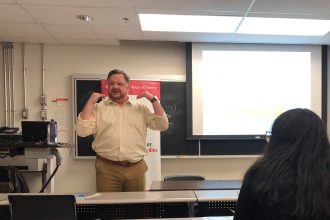To say that earning a university degree is laden with stress is trite. The stress of managing a full course load is often the bare minimum for a McGill student. One’s financial standing is also of major concern, as some students have to juggle one, two, or three jobs, maintain scholarship and aid requirements, and worry about repaying their student loans. Membership – and often leadership – in clubs and societies, coordinating and attending events and conferences, and playing sports create another layer of commitment that can become near impossible to balance. Alongside maintaining a “healthy” social life, students have very little time remaining to focus on themselves.
For many McGill students, this stress has come to define how they experience their time at university. The pressure of managing one’s social and work lives in university is unique, due to the necessity of managing academics before all else. While students will likely continue to juggle jobs and social lives once leaving the Roddick gates, it will no longer be on top of four to five courses: this is what makes university stress so particular.
The stress during one’s time at university is not eased by its temporality: the ‘work hard, play hard’ mentality is so pervasive at McGill that the idea of disregarding one’s academics, work, or social life is a non-option. There is a lot to juggle over the course of an undergraduate career, and the pressure to have it all can be mentally exhausting. Simply put, McGill is a stress bubble.
The Turn
The pressures of maintaining a “work-life balance” at McGill cause many students to turn to the “vices” that Deputy Provost (Student Life and Learning) Ollivier Dyens described in his now infamous November “hygiène de vie” interview. These “vices” have become reality for a plethora of McGill students. Many may start drinking several cups of coffee a day, take up smoking cigarettes, or cut down on sleep — what Dyens would likely refer to as poor “hygiène de vie.” As well, many students will turn to Ritalin, Vyvanse, Concerta, and Adderall to help. These drugs are used to treat attention deficit hyperactivity disorder (ADHD), but are considered to be “performance enhancing” when used without a prescription. They are amphetamines, and their peculiar effect of increasing concentration and focus has made them a prized possession for long nights spent writing papers or eighteen-hour days cramming for exams.
the ‘work hard, play hard’ mentality is so pervasive at McGill that the idea of disregarding one’s academics, work, or social life is a non-option.
Recent studies by post-secondary institutes such as Columbia University, University of Western Ontario, and University of Toronto suggest that more than one in 20 North American students used study drugs from 2017-2018.
The Setting
Currently, McGill does not include the use of ‘performance-enhancing’ study drugs in its rules and policies on Academic Integrity. In fact, both disciplinary and support measures for study drugs are non-existent at McGill.
The McGill Counselling Services website, for example, has “self-help” pages dedicated to Anxiety, Stress and Substance Use. However, they consist only of drop-down lists naming different smartphone applications, books, podcasts, and websites to be consulted. The Counselling Services page for ADHD is filled with similar resources. Notably, the “perfectionism,” “study skills,” and “procrastination” pages are identical.
McGill Counselling Services also offers workshops on academic success, wellness, and life skills, including Skills for Time Management and Skills for Managing Anxiety & Stress. However, all except for Mindfulness Meditation require registration ahead of time. For students already overburdened by school and other commitments, forfeiting a few hours even once a month is a sacrifice many are unwilling to make.
The High
The transition from high school to university causes many first year students to struggle with their first sets of midterms and exams, and there is a subsequent steep learning curve on how to learn. Moreover, the workload typically only increases as students progress through their McGill education. As students get older, the prospect of finding an internship or a full time job, or being admitted to a graduate program, becomes all the more daunting. At the same time, the pressure to meet specific GPA standards designated by employers and admissions committees becomes ever greater. While students can succeed by skimming the readings or listening to recorded lectures at 2x speed in a handful of first year courses, the potential for success with those methods in upper-year courses tends to diminish with every jump from in course level. Balancing the full workload of four or five such courses with extracurriculars, interviews, applications, and any shred of a social life, all while striving to meet the high margins set by external institutions, becomes near-impossible for many.
According to the students polled for this article, most who use “study drugs” without a prescription purchase them from friends who have one. Some students have remaining pills and refills from old prescriptions that they no longer need — they either take them during high-stress periods or sell them to friends. Some ADHD medications, such as Vyvanse, which offers less pronounced side effects than other similar drugs because of its chemical makeup, can be slightly harder to find than Adderall, Ritalin, or Concerta, all of which are relatively easy to find on campus.
McGill students take them because, as one student noted, they “can’t keep up with the volume of work, especially during finals week, at the same rate as [their] peers,” or because they struggle with the sheer volume of readings to get through before an exam.
I find it really hard to sit and focus for more than 3 hours [without drugs]… most people I’m surrounded by can do more than 6 hours without any drugs,
One student discussed the energizing effect of the drugs, and how one pill in the morning eliminates their need for coffee or a nap midway through the day, especially during final exams, midterms, or paper seasons, when bedtime is somewhere between 2:00 a.m. and 4:00 a.m., and wake-up is between 6:00 a.m. and 7:30 a.m.
Others still emphasized the creative effect that Vyvanse, in particular, has on them. They noted that when writing a paper, all of their best ideas come after having taken Vyvanse, and that they experienced an abundance of ideas that was simply impossible to tap into when “sober.”
One student stated that taking Vyvanse makes her forget about the anxiety that typically plagues her on a day-to-day basis. She said that when she has taken Vyvanse, she “can just sit down and work, and not think about the other five hundred things [she has] to do, what [her] GPA will be if [she gets] a certain grade on a final exam, or generally what else is going on in [her] life outside of studying for the final or writing the paper at hand.” Others, however, noted that “study drugs” make them significantly more anxious than they would be had they not taken them, with some claiming that the anxiety the drugs create fuels them to sit and focus on their work. Anxiety is a common side effect of these so-called “performance enhancing drugs.”
The majority of students polled agreed that the primary reason for using “study drugs” without a prescription is because little else can help them focus. As put by one student, “I find it really hard to sit and focus for more than 3 hours [without drugs]… most people I’m surrounded by can do more than 6 hours without any drugs,” which makes using the drugs a necessary measure for keeping up with peers. Another student praised a common side effect of the drug —- a decreased appetite — as one of its benefits. She claimed that by eliminating her hunger, the drugs helped her stay focused for significantly longer than on days she had not taken them, because she did not start thinking about what she wants for lunch just a few hours after sitting down in the library.
The Comedown
The two most ubiquitous “performance enhancers” the students that spoke to The Bull & Bear take – Adderall and Vyvanse – have significant side effects. In addition to a decreased appetite and weight loss, side effects include sleeplessness, fast heartbeat, sweating or fever, nausea or vomiting, diarrhea, muscle tightness, nervousness and anxiety, stomach ache, dry mouth, irritability, dizziness, blurred vision, and increased or decreased blood pressure.
Many surveyed students reported a common feeling of sitting in McLennan with freezing, clammy hands and profusely sweaty armpits after taking a “study drug,” but considered that this was the price to pay for a full day of focus. Others discussed the horrible sleeplessness they experienced at the end of a very long day, and some noted that they either took a sleeping pill or smoked marijuana before bed to calm down after using Vyvanse or Adderall.
Their ubiquitous nature, coupled with the nonchalant attitude so many students take toward them, point to a larger, more systemic problem within the McGill community.
One student confessed that they used Vyvanse for nearly two weeks before a midterm worth a significant portion of their grade, and experienced horribly blurred vision for most of the second week. The student told us, however, that they would not have been able to get through and master all the material had they not taken the drugs. Still another student noted that there have been times where her “heart rate increased and [she started] shaking, which [made her] anxious,” but that those side effects were a small price to pay for the perceived benefits of using Vyvanse.
The day after using a “study drug” is often difficult for students, and some cited a sluggishness and moodiness comparable to that of a hangover. They noted that they are typically less productive the day after use than a normal, unmedicated day, and thus have to carefully plan when they will use the drugs around their academic and social schedules.
Notably, no students discussed the illegality of possessing and buying pharmaceutical drugs without a prescription as a drawback, perhaps alluding to the intense academic pressures that prompt McGill students to use these medications. Some, however, noted that they would not touch “study drugs” after graduation, and that using them was a phenomenon highly specific to undergraduate years.
Much like the stress of working toward an undergraduate degree, the relief a “study drug” provides is transient. Those who use them for several months can experience painful periods of withdrawal when they stop. Depression, mood swings, aggression, and an inability to feel pleasure without the drugs are all common after sustained use. The longer one misuses prescription stimulants, the worse these withdrawal symptoms get.
While not every McGill student uses ADHD medicine to enhance their academic performance, the students who spoke to The Bull & Bear noted that they are quite common. Their ubiquitous nature, coupled with the nonchalant attitude so many students take toward them, point to a larger, more systemic problem within the McGill community. Whether it be an issue of unmanageably large workloads, unaccommodating professors, or restricted access to the support services that so many students need to maintain their health and wellbeing, the kids will not be alright until this problem is resolved.
This piece was featured in The Bull & Bear’s Winter 2018 Print Edition. Read it here.








